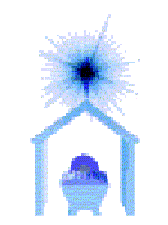Irony in the Manger |
|
| Luke 2:4-7: "So
Joseph also went up from the town of Nazareth in Galilee to Judea, to Bethlehem the town
of David, because he belonged to the house and line of David. He went there to
register with Mary, who was pledged to be married to him and was expecting a child.
While they were there, the time came for the baby to be born, and she gave birth to her
firstborn, a son. She wrapped him in cloths and placed him in a manger, because
there was no room for them in the inn." Luke's report of this most significant event is matter-of-fact. It explains to us the irony of a family, long seperated from its distant, royal roots, reduced to the incovenince of Roman rule and the dishonor of giving birth in a barn. This is itself paradoxical enough, and how very true to life. A desperately exhausted Mary at the full-term of her pregnancy and a worn-out Joseph are left with the worst accommodations. We are far from the palace of a king. Yet what is left unstated is equally an incongruity, for Luke, like every good Christian, knows that this newborn is Messiah and God. The great North African Bishop, Augustine of Hippo wrote a poem that explores this profound puzzle:
The birth of Jesus is full of paradox: that infinite power could be expressed in helplessness; that infinite space would recede to a few pounds and inches of scrawny, human child; that God the Word would first come unable to use language. Writers often work to craft an ornate passage full of crisp details only to discover that the simplest words are all that are needed. Indeed, such rich simplcity may express more eloquence than a more mannered draft. "Ah, those few little words are perfectly enough" the author concludes. And we sense that to say more at this time would undermine the simple truth. So Christ came in such simplicity.
|
|
